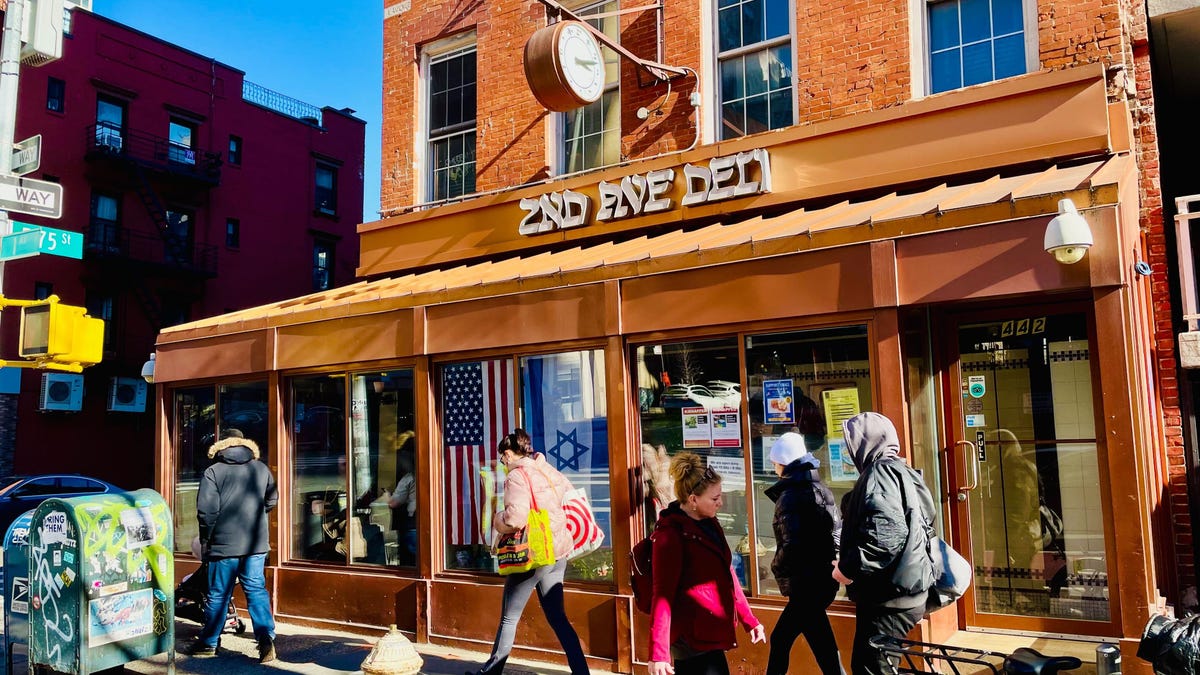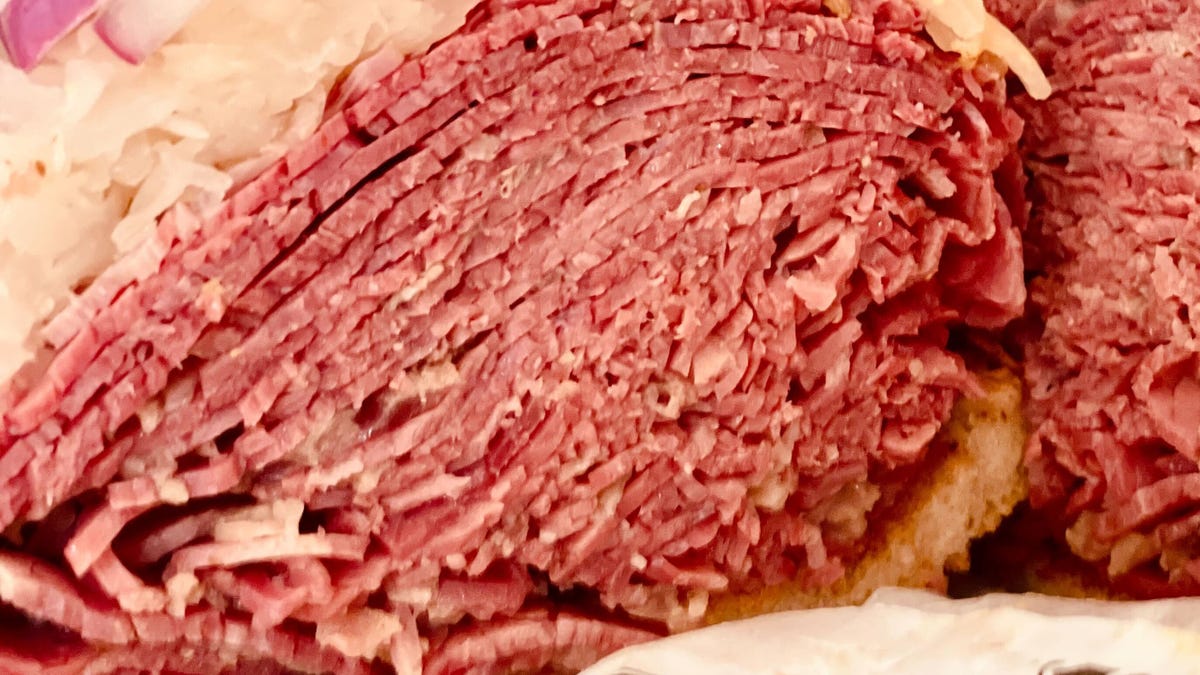Daredevil chipmunk steals bear's food
A brave chipmunk at the Orphaned Wildlife Center in Otisville, New York, was spotted snatching snacks near a bear. Co-founder Susan Kowalczik told Storyful that she's never seen one do this — that the chipmunks have "lost their minds."
Born in brine and bounded by rye, the layers of corned beef serve as pages that tell the delicious story of the American experience.
New York City's globally renowned corned beef sandwiches were carved from Old World immigrant food preservation techniques in the hardscrabble Lower East Side of the 19th century.
What emerged from the struggle was an oversized all-American culinary delicacy as big, bold and ambitious as the dreams of the immigrants who built the boundless nation.
HOT BEEF COMMERCIAL, A MINNESOTA COMFORT-FOOD CLASSIC, IS THE 'MOST DELICIOUS THING YOU CAN EAT'
The Jewish delis of New York City, including Ben's Kosher Delicatessen, Katz's Delicatessen, Second Avenue Deli and Sarge's Delicatessen and Diner, among others, stand today as pop-culture icons and bucket-list destinations for food lovers from around the world seeking a true taste of America.
"The delis we know today originated here on the Lower East Side when Jewish immigrants arrived in the late 1800s," Jake Dell, the fifth-generation owner of Katz's Deli, told Fox News Digital.

Here's a look at a corned beef on rye with hot peppers, sauerkraut and mustard from Ben's Kosher Delicatessen in Greenvale, New York. (Kerry J. Byrne/Fox News Digital)
Jews from Europe found themselves packed in a first-of-its-kind global melting pot ghetto beside Catholics from Ireland and Poland, protestants from Germany and a myriad of other people from cultures all around the world.
HERE'S HOW ABE LINCOLN, CORNED BEEF CONNOISSEUR, FLAVORED AMERICA'S ST. PATRICK'S DAY CELEBRATIONS
Poor Jewish refugees, much like their Irish neighbors, took the cheapest scraps from America's beef industry, tough-cut brisket most notably, and preserved the meat in salt and various pickling spices in the era before refrigeration.
"Delis became a home away from home if people didn't want to go to shul or the synagogue."
There is no corn in corned beef.
The phrase instead references the large kernels of rock salt traditionally used in the brine.
NEW YORK WOMAN HONORED WITH SPECIAL DESSERT AT POPULAR RESTAURANT FOR HER 70 YEARS OF LOYALTY
Pastrami, a close cousin of corned beef, is similarly cured but from navel cuts of beef and then smoked. It's typically darker than corned beef and recognizable by its black-pepper crust.
The corned beef sandwich is now an American culinary delicacy and a signature taste of the Big Apple beloved by New Yorkers from all walks of life.

This is a corned beef sandwich from Katz's Delicatessen in New York City. Founded by Jewish immigrants on the Lower East Side in 1888, Katz's is a bucket-list destination for food lovers from around the world. (Kerry J. Byrne/Fox News Digital)
New York City's Jewish delis grew in popularity in the wake of the Holocaust, according to historian Marilyn Kushner.
"A lot of times when survivors came here after World War II, they would gravitate toward the delis because that's where they found community," Kushner told Delish.com in a 2022 interview.
"Delis became a home away from home if people didn't want to go to shul or the synagogue."
CHICAGO'S ITALIAN BEEF, POPULARIZED BY 'THE BEAR,' IS WINDY CITY'S 'REAL ROOT FOOD'
Jews could "find friends and sometimes even employment"at the local deli, the story adds.
Delis have waxed and waned in popularity over the years.
The world-famous Carnegie Deli in Times Square closed in 2016. Second Avenue Deli shuttered its celebrated East Village location in 2006 and reopened in 2007 on First Avenue on the Upper East Side, keeping its original name.
Reuben's Restaurant and Delicatessen, the reported namesake of the sandwich, closed in the 1980s after decades of popularity.

The original Second Avenue Deli, on Second Avenue in the East Village, closed in 2005. It reopened (pictured above) on First Avenue on the Upper East Side in 2007 but kept its famous name. (Kerry J. Byrne/Fox News Digital)
Katz's achieved global notoriety for one of the most iconic scenes in Hollywood history in the 1989 hit movie "When Harry Met Sally."
Co-stars Meg Ryan and Billy Crystal were eating lunch at Katz's when "Sally" loudly feigned heightened pleasure in the packed restaurant.
"I'll have what she's having," an older female diner — played by Estelle Reiner, mother of director Rob Reiner and wife of comedian, actor and entertainer Carl Reiner — famously deadpanned after the salacious spectacle.
CLICK HERE TO SIGN UP FOR OUR LIFESTYLE NEWSLETTER
A sign hangs over the table today celebrating its role in silver-screen history.
Dell, the owner of Katz's, said fame has not changed the essence of the New York deli experience.
"We focus on three things and always first is the food quality," Dell said.

A corned beef sandwich from New York City landmark Second Avenue Deli. (Kerry J. Byrne/Fox News Digital)
"It doesn't matter who you are or what your history is if your food sucks."
CLICK HERE TO GET THE FOX NEWS APP
Katz's, he added, continues to patiently cure its own corned beef in house, while nostalgia and tradition are essential to the experience, too.
"This place is a time capsule and this food is a time capsule. We embrace that and we love it."
Each sandwich is hand-carved right in front of the customers who enjoy a fresh-cut sample of their meat selection while waiting.
Katz's clings to its archaic deli-counter ticket-and-pay system as part of the experience, despite more efficient modern check-out methods. A World War II-era sign still declares, "Send a salami to your boy in the Army."
For more Lifestyle articles, visit www.foxnews.com/lifestyle
"This place is a time capsule and this food is a time capsule. We embrace that and we love it," Dell said. "Katz's has that atmosphere where it's a fun place with lots of energy and still has tradition."

